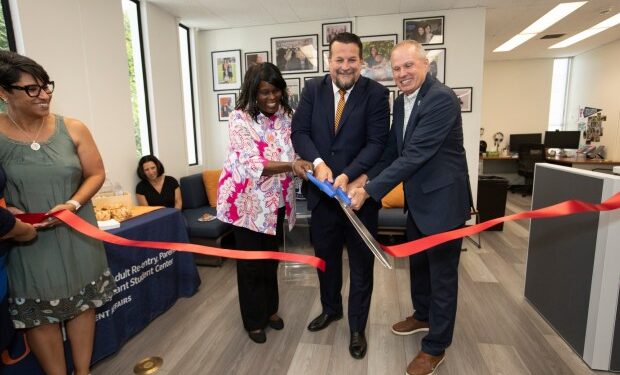By Larry Urish, contributing writer
Picture, for a moment, your typical Cal State Fullerton student. You might imagine a bright-eyed teen or 20-something who hit the ground running straight out of high school. However, a high percentage of the total campus enrollment doesn’t fit into this cookie-cutter mold.
That’s where the university’s TAPP Center comes in.
CSUF’s Transfer Adult Re-entry Parenting & Pregnant Student Center was created in the spring of 2022 to assist the estimated 40% of the university’s total enrollment who fall into the following categories: students who have transferred from a community college or another university, “adult learners” age 25 or older, those who are re-entering college after taking time off, and students who are parents or will soon become parents.
The TAPP Center assists more than 4,000 students, and with TAPP’s recent move to a larger space, in Langsdorf Hall, more students can now benefit from all that the center offers.
Talk to anyone associated with TAPP and the same word quickly and repeatedly comes up: “community.”
“The TAPP Center is all about building community, which is behind a lot of our programming,” said Futoshi Nakagawa, TAPP’s associate director. “It’s the ‘secret sauce’ behind what we do.”
Laura Hooks, the TAPP Center’s assistant director, concurs. “We’re able to link student connection with student success,” she said. “Students who find community get a reason to continue, which especially helps those returning to school, with or without children.”
The TAPP Center’s support was long overdue. “Our transfer student and adult-learner populations were more or less ignored,” Hooks said. “There weren’t a lot of services or opportunities for them, places where they felt they belonged.”
“Many students are often overlooked when entering a four-year university,” Nakagawa said. “We’re here to help them navigate the huge campus and make the transition smoother. The TAPP Center helps them feel welcome, valued and connected.”
TAPP supports students through a variety of community-building events and programs, such as family-friendly affairs: drop-in child care during midterms and finals, pool parties, movie nights, pregnancy-care packages (“Tiny Titan Bundles”) and more. The center also provides one-on-one peer guidance and academic support, to ease the transition to CSUF and facilitate student success. The Tuffy Tidings holiday gift drive assists students in CalWorks, a program that furnishes cash aid and services to needy California families.
In addition, “We have awarded more than $250,000 in scholarships since we opened,” Nakagawa said.

The TAPP Center’s collaboration with other key programs and resources throughout the campus remains an essential element behind much of what TAPP does. Just one example, Nakagawa said, was Transfer Thursdays, Zoom-based programming for incoming fall transfer students that took place every Thursday from July 11 to Aug. 1. The lineup included workshops about the University Learning Center, which provides one-on-one tutoring and study groups; all manner of academic assistance through the Supplemental Instruction Program; the assortment of programs furnished by the Center for Internships & Community Engagement; and the tech devices and access to technology provided by the Center for Equitable Digital Access.
Another example is the TAPP Center’s collaboration with TitanWELL and TitanTHRIVE. TitanWELL’s “Lunch and Learn: Healthy Eating” promotes the importance of proper nutrition while balancing school, work and family. And TitanTHRIVE’s two-hour “Empowering Self-Defense” program furnishes, among other elements, effective verbal techniques, awareness skills and confidence-building practices.
Senior sociology major Evelyn Alvarado Avalos, a transfer student from Rio Hondo College, discussed the benefits of her involvement with the TAPP Center.
“After transferring, I felt extremely lonely,” she said. “But after learning about the TAPP Center, I began to feel a greater sense of community. It has helped me as a student by making sure I have a safe space and by giving me a sense of belonging with other transfer students on campus.”
TAPP’s new, larger space in Langsdorf Hall (Room 216) has a more “student-lounge” feel, Nakagawa said. “The majority of the center is now for student use. The Wakeman Seminar Room, a space for adult learners, is separate from the rest of the center. We’ve also added a new adult-learner coordinator, who has a separate office as well.”
Given the high number of CSUF students who meet the TAPP Center’s criteria, program growth remains an ongoing topic. “We’d love to expand,” Hooks said. “It’s all based on funding and campus real estate. Space is a challenge.”
“This year we worked with Campus Housing to get a (separate) floor for transfer students,” Nakagawa said. “We’d also like to explore resident hall options for parenting students and their families.”
Hooks stressed that the collaborative nature of the TAPP Center is essential to its positive influence. “The success of the Center doesn’t happen without the entire team here,” she said. “We’re all invested in this, and we’re all part of the community that we represent.”







